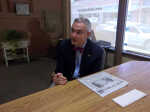KU rep stops in town

With an eye toward ensuring the University of Kansas is equally well-known for its academics and athletics, school representatives have been sweeping across the state in a series of events called "Hawk Days of Summer." The most recent was at Fort Scott Community College earlier this week.
The only way to understand the state is to get out and explore it, KU Vice Chancellor for Public Affairs Tim Caboni said. "If we're going to be the University of Kansas, we've got to be the university of all of Kansas."
Among the things KU wants people -- and potential students -- to know is that it's thinking about revised admission standards, it has the No. 1 city management program in the country, has won five national championships in debate and has a top-notch special education program, Caboni said.
In January 2011, the Board of Regents asked the university if it wanted to use data to help inform admission decisions to focus on student success. Currently to be admitted to KU, a student must score a 21 on the ACT college entrance exam, or a 2.0 GPA having taken the Kansas core curriculum, Caboni said.
To be admitted to KU automatically, new freshmen must take the Kansas Qualified Admissions Precollege Curriculum, graduate from a high school or home school, and meet one of two GPA/ACT thresholds. The first requires a minimum 3.0 high school GPA combined with a 24 on the ACT (1090 SAT), while the second requires a minimum 3.25 high school GPA and a 21 on the ACT (980 SAT). The ACT is scored on a scale up to 36 and the SAT, 2400.
If a student is not automatically admitted, their application will be reviewed by a committee, which could yield admission, or the prospective student could be told what they need to do to reapply successfully.
This committee will make its decision based on a students' special talents, parents or grandparents who were Jayhawks, background and trajectory -- someone who may not have the GPA to guarantee admission but who demonstrates great potential to succeed, Caboni said.
KU also wants to have strong transfer and articulation agreements with community colleges so students can more easily transfer from two-year schools to the university, Caboni said.
Student retention is also a university goal. Some 80 percent of students make it to their sophomore year. Based on a six-year time frame, KU's graduation rate is about 60 percent. As part of its strategic plan, KU wants to move the retention rate up to 90 percent and the graduation rate to 70 percent.
"That will move us closer to our AAU (Association of American Universities) peers," Caboni said. One of the ways KU hopes to keep students is by creating learning communities, such as launching a common book program where each freshman gets the same book and they are divided into smaller groups of about 20 so they can discuss it. "Hopefully, the author comes to speak in the fall," he said.
For a full-time student taking 12 credit hours, it costs $9.000 a year to attend KU, Caboni said.
The university's four-year scholarships are also now renewable and as part of its capital campaign, "we're making student aid a priority to help support students who have a demonstrated need," Caboni said.
A recent development the university is quite proud of is the official announcement that the University of Kansas Cancer Center was named a National Cancer Institute cancer center. Caboni confirmed the quest for this designation has been going on since the 1970s, but the most recent effort has lasted 10 years.
The National Cancer Institute recommended The University of Kansas Cancer Center for the designation at a June 25 meeting in Bethesda, Md.
As a result of the designation, KU Cancer Center Director Dr. Roy A. Jensen said, patients will have access to clinical trials that are available only to NCI-designated cancer centers.
The University of Kansas Cancer Center will be able to apply for federal research grants only available to NCI-designated cancer centers, with the potential for bringing millions in additional funding to the area, a news release said.
